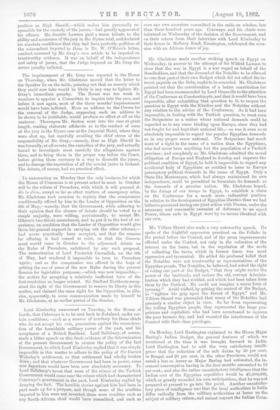Mr. Villiers Stuart also made a. very noteworthy speech. ire
spoke of the frightful oppression practised on the Follahs in the period before the Control, and of the great improvements effected under the Control, not only in the reduction of the interest on the loans, but in the regulation of the mode of collecting the taxes, which in former times was most oppressive and tyrannical. He added his profound belief that the Notables were not trustworthy as representatives of the Egyptian people. The Notables, he believed, had asked the right of voting one part of the Budget, "that they might revive the power of the bastinado, and restore the old, corrupt Adminis- tration which they had wielded, and which had been taken from them by the Control. He could not imagine a worse form of tyranny." Arabi wished, by getting the control of the Budget, to "tighten his grip upon the throat of Egypt," and Mr. Villiers Stuart was persuaded that many of the Notables had precisely a similar object in view. So far from representing the toiling Egyptian people, they represented the large pro- prietors and capitalists who had been accustomed to squeeze the poor farmers dry, and had resented the interference of the Control with their class privileges.






























 Previous page
Previous page